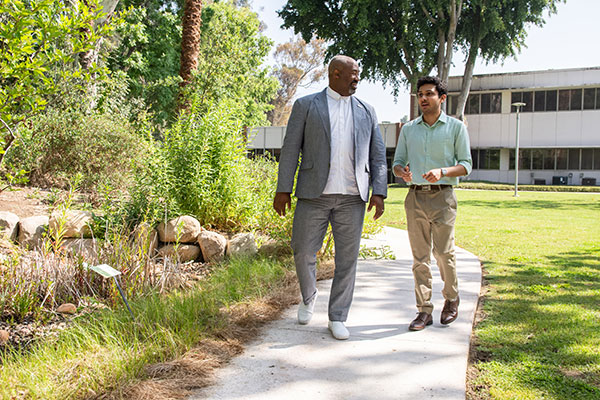Cal Poly Pomona's Office of Academic Innovation has been awarded $1.7 million in grant funding for its Community Partnership for Student Success project focused on micro-internships to create innovative learning practices and drive educational advancement for Cal Poly Pomona students over the next 3 years.
Funding from the Michael & Susan Dell Foundation and the California Community Foundation (Los Angeles Scholars Investment Fund) will support the implementation of hands-on micro-internships through participating courses that integrate the learn-by-doing philosophy directly into the class curriculum.
Micro-internships offer shorter, more accessible alternatives to traditional 10-week summer internships.
"It's a four-to-eight-week project. They're doing something meaningful for a nonprofit organization or school, it's not just busy work. Students will have a project with a beginning and end," said Olukemi Sawyerr, the associate vice president of the Office of Academic Innovation. "They're doing something that is so meaningful and necessary and impactful for these nonprofits. Students will get to use their talents and get paid for the micro-internship work they complete."
Developing the project was a collaborative effort by Sawyerr and Bryant Fairley, director of the Innovation Incubator. Jerry Yu, the director of Foundation Relations, supported the effort by reaching out to the funders. All three expressed their gratitude and appreciation to the Dell Foundation and the California Community Foundation for their generous support.
The grants will provide paid opportunities for students to work on short-term projects that will enhance their educational experiences, promote collaboration with nonprofit organizations, and provide them with real-world experiences where they can apply their skills.
According to Sawyer, research has shown that students who engage in internships have higher success rates in school and their careers. The micro-internship program will involve short-term projects equivalent to 40 to 60 hours, embedded into a course structure that allows every student to have a paid work experience.
Research on internships shows that they are critical for students who transition into professional opportunities because 77 percent of internship hosts hire their interns," according to Sawyerr.
Each micro-internship project will make it accessible for students with busy schedules. Participants will not only gain valuable experience but also receive compensation for their work and potentially earn digital badges to acknowledge the completion of the course.
For students who are struggling financially, many of them first generation or from underserved communities, an unpaid internship is not feasible, Fairley said. This grant will help students as they will be able to focus on the course, gain experience and get paid for their commitment, he added.
"It will allow people to, in a sense, get paid for professional experience prior to graduation," he said.
Beginning in fall 2023, Academic Innovation will be working with faculty from across campus to offer more courses with an embedded micro-internship component. The Community Partnership for Student Success project aims to enroll 500 students in the micro-internship program this year, and then expand to 1,000 students in year 2, and 1,500 students in year 3. The micro-internships are open to all, including Dreamers and international students.
Enrolled in one of two classes that test piloted the concept last year, Kinesiology student Jonathon MaCall completed a micro-internship at IPoly High School during the spring semester and said it was fun.
"To those who are maybe on the fence of whether they want to do it or not I highly recommend doing it," said MaCall. "You get a real hands-on experience of what it's like teaching a real class of students and the faculty we worked with were super friendly and easy going."
Kinesiology student, Cameron Keller, who also participated in a micro-internship at IPoly, praised the experience.
"My expectations were surpassed during this [micro] internship. I was expecting to develop experience that would help me become a better PE teacher which it did," said Keller. "However, I also got to develop relationships with the [high school] students that was awesome. We respected each other, which made it a great experience for everyone. This [micro] internship made me more eager to get ready to start my career as a PE teacher."



